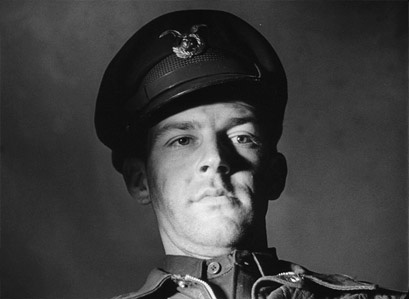Fear and Desire
Stanley Kubrick dismissed his maiden voyage as director, 1953's FEAR AND DESIRE, as "a child's drawing on a fridge." I've read that he attempted to burn the negative. A print in fact survived at Kodak headquarters in Rochester and had a few screenings before it was finally released on DVD in 2012. I am pleased that this barely over one hour long feature was not incinerated, doomed to be conjectured over and wondered about rather than seen. While the film is often amateurish and overbaked, early efforts from geniuses are invaluable to assess later. I would say likewise of those old Fagen/Becker demo tapes, the ones the guys likewise unsuccessfully tried to bury.
Kubrick made later, far better anti-war films but FEAR AND DESIRE plays like an eager young artist's desperation to get all those themes in his head out there, in case maybe he won't ever get the chance to make another movie. To get the picture made, the director scraped funds from family members and had some of his actors play dual roles, and the film did not do business. It is not too difficult to see why. While it is just as hilariously overwrought and melodramatic as many other films of its period, its ideas are perhaps too heady and laid bare a bit too obviously for a mid-twentieth century audience member's mindset. Did people laugh at this movie?
Obvious is not something you associate with Kubrick. This is the one film in his canon to just spew it all out there, right from the droning narration during the opening. There are four soldiers whose airplane has crashed behind enemy lines. We learn their names, but have no idea who they fight for, or whom their enemies do likewise. They are attempting to get home. There are disagreements on the plan.
There is a war in this forest. Not a war that has been fought, nor one that will be, but any war. And the enemies who struggle here do not exist unless we call them into being.
Sounds like a film student's first draft. Screewnriter Howard Sackler was in fact Kubrick's high school classmate. Sackler's sensitive, maudlin observations on the perils of war upon men are as heavy handed as humanly possible, with characters sitting and bemoaning their lots and fates. Speaking of man's incompatibility with the wears of war. Sometimes we hear their thoughts as they push a raft down a river on a potential suicide mission. Most of it sounds terribly overwritten. People do have such verbose thoughts, but on film it just feels desperate, a grotesque cabaret.
Critics of Kubrick's FULL METAL JACKET may call that film just that; it's pretty in your face, without a lot of the nuance of PATHS OF GLORY. But both films use their candor and blunt force to show the nihilism and devastation of battle, and its erosion of the men who fight. FEAR AND DESIRE plays like a high school teacher's wordy analysis of that theme. What about the "desire" of the title? The soldiers happen upon a peasant girl who doesn't speak their language. They "fear" she will alert her generals of their presence, so they bind her to a tree, leaving the neurotic Private Sidney (future film director Paul Mazursky, overracting wildly) to stand guard. How their relationship plays out is clumsy and ineffective, despite a few good ideas. Those multiple goofy close-ups (present throughout the film) do not help.
Kubrick's work here is not grade Z, not in the Ed Wood school. His photography is striking at times, and his compositions are always commanding. He shot pictures for Look magazine prior to FEAR AND DESIRE. His editing is far less impressive, though at times there are some effective transitions. If you go back and watch the film again, you may detect some of those intangible moments that make a director more than just someone who barks orders and moves traffic. Moments that cannot be put into words, but you know a genius (or one to be) is at work.



Comments